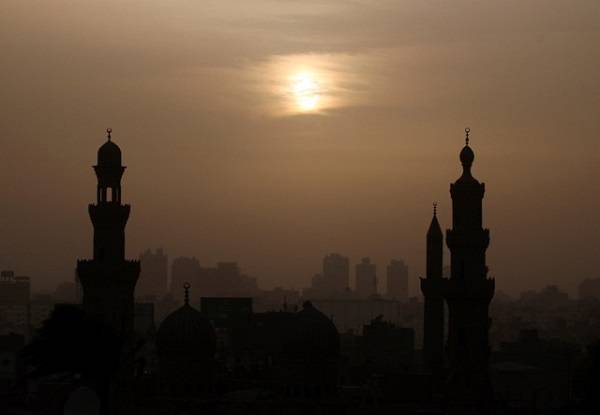In Kashmiri culture, we have a bogeyman called the "khok" roughly translated as (fear) which parents use to coerce toddlers into finishing their meals, keeping quiet and generally behaving until he/she dozes off and the primary care taker parent gains sanity and strength. My husband and I pledged not to use the "khok" trick for our child in his formative years because we were astute and well-read enough to realise the adverse effects of putting fear inside the mind of a child. I did lapse on occasion being a stay-at-home Mom for the initial two years, but my spouse's steadfastness ensured that whatever harm I had caused our 'pearl', it was reversed.
Anyway, we have the same "khok" for things we tend to brush under our world famous, intricately designed carpets because they challenge our piety and respectability, our religious beliefs and sense of purpose - in short the meaning of life. Recently, the global scenario for Islam doesn't appear to be very good and this is compounded by the fact that majority Muslims are still not willing to introspect and engage in dialogues across faiths and cultures. We even have Universities (the centres of learning and dissent of yester-years) appealing for "safe spaces" from what they perceive are threats to their beliefs systems.
How did we come to this mollycoddling? How did we ever come to this dissociation with reality and desensitization of the the pain of our very own? When are we ever going to reflect and introspect about our collective path towards progress - or destruction? It's not like there never has been any dissent or heresy within Islam. There were dissenters as early as during the Prophet's time and as late as today like those languishing in Middle Eastern jails under the unjustified blasphemy laws. Depending upon the Caliph, regime or government in power, the heretics suffered all sorts of punishments from lashings, to torture to beheading. Rarely but occasionally they were pardoned or at best told to recant their findings. But the tradition of zanadiqa (heresy) has grown unabated with each century. The technological advances of the 21st century just brought it to everyone's fingertips. Hence it's easy to connect, expose, ridicule, scrutinise, verses, traditions, sayings, myths, legends and folklore and subject them to intense academic scholarship.
I think it is time to consider what exactly it is that is being feared here. That the beliefs that have been held so close and so obstinately by our ancestors for centuries are under scrutiny like never before due to advancements in science and technology? That whatever sense of superiority we may have felt of our Islamic civilization is getting shaken? That the oil rich barons whom we placed on pedestals, made into demi-gods and considered unblemished lie exposed for their human frailties? That we may have to whether, we like it or not, co-exist with other beings on this 'pale blue dot' who speak different languages, may or may not have other belief systems and though respect and uphold our narrow-minded and misogynistic laws will in return want their freedom of expression to be upheld in the bargain?
Fear used to be an evolutionary survival trait, still is. Facing our fears and trying to overcome those fears is what modern human beings have sought to do with research, exploration, discovery, innovation, invention, discussion, exchange of ideas, so on and so forth. It has led to the emergence of great and rich cultures, brilliant contributions to humanity and a profound revelation of the diversity of this planet in nature. Shouldn't we be going past this fear to embrace our full potential?
It's time to address the bogeyman. The "khok" about taboo issues such as incest, marital rape; the honor brigade's repressiveness in families; the enforcement of silence over injustices and unfairness; the discrimination between daughters and sons; the blatant sectarian hatred between Shias and Sunnis; the open viciousness against the gay community and atheists/agnostics; the upturned noses at 'Biharis', 'Punjabis' and anyone from outside the Banihal tunnel; the total rejection of multiculturalism and plurality since the 90s and so on and so forth. I have had personal experiences where incidents of incest, sexual and verbal abuse, domestic violence, marital rape have been covered up because the family honor is/was at stake. In almost all the cases, the male members of the family would go scot-free, emboldened to do it again and again with impunity. It's taken me well over three decades to dig, explore and sift why it is particularly prevalent in Muslim societies, particularly in the subcontinent. One's own family is always a great sample to work with. The dynamics, the subtleties, the sub-texts, contexts, etc can be caught, observed, studied by dissenters within which more or less an interviewee or sociologist or "reporter" may not be able to.
I have unearthed that the the Muslim culture is plagued with the repressiveness of the honor brigade. Honor has been used as a silencing tool to enforce conformity and submission coupled with the "fear" of ostracism and estrangement from the tribe. Victims of crimes and miscarriage of justice are effectively rendered the "Other" and unwittingly into a position of watching the society without rose-coloured glasses. And it is these who become the first dissenters or adversaries as I like to call it to the perceived stability of repressive cultures. We cannot ignore the fact that we live in an overwhelmingly patriarchal society where the men rule, make laws and even decide our lifestyle choices right down to what we should like and dislike. This tendency to ignore the issues of misogyny, bigotry and suppression are the dynamics of patriarchy put in place so that the society appears stable.
It's time we brush up our image for our fellow brethren. That we show good faith in coexisting and not compound the lives of our own communities by adding to the real cases of Islamophobia and the evil designs of the radicalised groups. It's time face the "khok".






